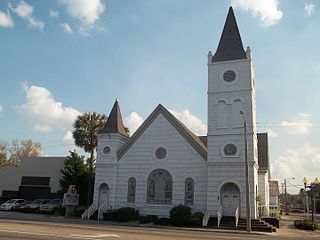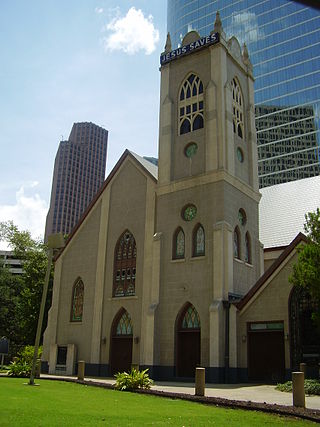
Lauderdale County is a county located on the western edge of the U.S. state of Tennessee, with its border the Mississippi River. As of the 2020 census, the population was 25,143. Its county seat is Ripley. Since the antebellum years, it has been developed for cotton as a major commodity crop.

Haywood County is a county located in the U.S. state of Tennessee, in the region known as West Tennessee. As of the 2020 census, the population was 17,864. Its county seat and largest city is Brownsville. It is one of only two remaining counties in Tennessee, along with Shelby County, with a majority African-American population.

Brownsville is a city in and the county seat of Haywood County, Tennessee, United States. Its population as of the 2020 census was 9,788. The city is named after General Jacob Jennings Brown, an American officer of the War of 1812.

The black church is the faith and body of Christian denominations and congregations in the United States that predominantly minister to, and are also led by African Americans, as well as these churches' collective traditions and members. The term "black church" may also refer to individual congregations, including in traditionally white-led denominations.
Woodlawn Cemetery is the name of several cemeteries, including:

Nutbush is a rural unincorporated community in Haywood County, Tennessee, United States, in the western part of the state, approximately 50 miles northeast of Memphis. It was established in the early 19th century by European-American settlers who bought enslaved African Americans to develop the area's cotton plantations. The houses and churches that were built during this time still stand.

Trinity United Methodist Church in Nutbush, Haywood County, Tennessee was founded in 1822. Planters allowed their slaves to attend church with them.

The African Jackson Cemetery is a historic cemetery in the western part of the U.S. state of Ohio. Formed by a colony of more than 300 freedmen from Virginia, who were freed in the will of John Randolph of Roanoke, it has been the resting place for many. Active into the 20th century, it is one of the last extant physical remnants of Rossville, a black settlement founded near the city of Piqua in the late 1840s. The cemetery is listed on the National Register of Historic Places because of its connection to the history of free people of color in pre-Civil War Ohio.

State Route 19 or the Tina Turner Highway is a state highway in Haywood and Lauderdale counties in Tennessee, United States. State Route 19 is 42.81 mi (69 km) long.

State Route 180 is a secondary south–north highway in Haywood and Lauderdale Counties, Tennessee, United States. State Route 180 is 12.52 mi (20.1 km) long.
Flagg Grove School was a school south of Nutbush in Haywood County, Tennessee, now part of Brownsville. The school was established in the late 19th century and now operates as the Tina Turner Museum.

Roger Williams University was a historically black college in Nashville, Tennessee. It was founded in 1866 as the Nashville Normal and Theological Institute by the American Baptist denomination, which established numerous schools and colleges in the South. Renamed for Roger Williams, the founder of the First Baptist Church in America, it became the largest Baptist college in the area for educating African Americans. It was founded in a period when Protestant mission groups sponsored numerous educational facilities for freedmen in the South.

Springfield Baptist Church is a Baptist church in Augusta, Georgia was built in 1801 and is a significant historical building for its architecture, religious history, and African American heritage. It is affiliated with the American Baptist Churches USA.

Antioch Missionary Baptist Church is a historic Baptist church at 500 Clay St in Downtown Houston, Texas. It was historically a part of the Fourth Ward. As of 2012 it was the only remaining piece of the original Fourth Ward east of Interstate 45.
Republican Primitive Baptist Church is a historic African-American church of the Primitive Baptist tradition located in rural Haywood County, Tennessee, about 10 miles west of Brownsville.

The First African Baptist Church of Richmond, Virginia is a Baptist Church. Founded in 1841, its members included both slaves and freedmen. It has since had a major influence on the local black community. At one point, it was one of the largest Protestant churches in the United States.

Henry McNeal Turner was an American minister, politician, and the 12th elected and consecrated bishop of the African Methodist Episcopal Church (AME). After the American Civil War, he worked to establish new A.M.E. congregations among African Americans in Georgia. Born free in South Carolina, Turner learned to read and write and became a Methodist preacher. He joined the AME Church in St. Louis, Missouri, in 1858, where he became a minister. Founded by free blacks in Philadelphia, Pennsylvania, in the early 19th century, the A.M.E. Church was the first independent black denomination in the United States. Later Turner had pastorates in Baltimore, Maryland, and Washington, DC.

The Macedonia Baptist Church is a historic former Baptist church building near the community of Burlington at the southern point of the U.S. state of Ohio. Constructed in the middle of the nineteenth century, it held a significant place in the culture of the local black population, and it has been named a historic site.
The First Baptist Church of Fincastle, Virginia was started in October 1831 by slaves in Fincastle, Virginia in Botetourt County, Virginia.
George Washington Carver High School was a public secondary school in Brownsville, Tennessee. It served as the high school for black students until the public schools were integrated.


















